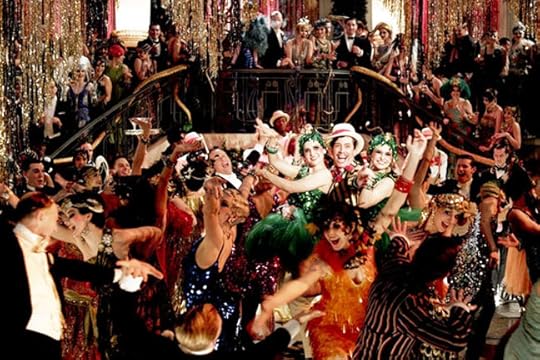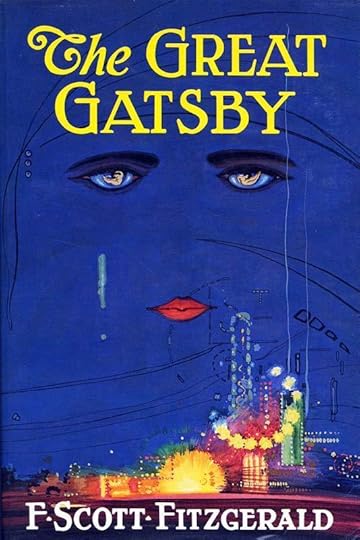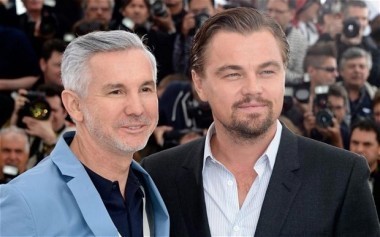Newest film rocks ‘Gatsby’

[Baz Luhrmann’s film is as gorgeous, specific, and unmoored as the novel.]
Great American Novel survives another film—will it survive itself?
On Sunday morning while church bells rang in the villages alongshore, the world and its mistress returned to Gatsby’s house and twinkled hilariously on his lawn.
—the opening to Chapter Four of The Great Gatsby
As famous as are The Great Gatsby’s gorgeous opening and ending passages, the above line shows as well as anything the1925 novel’s elusive poetic magic. Gardens are blue, cocktail music is yellow, and trays of silver drinks float in the dusk. In prose at once specific and grandly metaphoric, The Great Gatsby unspools a plot utterly American in its larceny and its romance: the story of a rags-to-riches-shady-but-essentially-good-social-climbing outlaw whose self-invention and male yearning end in murder.
Since I’ve loved Gatsby for much of my life, I resisted seeing until recently the latest movie based upon it. I doubted whether Leonardo DiCaprio could get off Gatsby’s “old sport” tic without sounding ridiculous. “Old sport” was the nail in the coffin of Robert Redford’s inert performance in the 1974 film flop.
Now comes Baz Luhrmann with Leo as leading man. The Aussie’s effort, Hip-Hop infused and with splashy 3-D option, is “pretty much a disaster,” rules David Denby of the New Yorker. “Gatsby’s big parties are a seething mass of flesh, feathers, dropped waists, cloche hats, swinging pearls, flying tuxedos, fireworks, and breaking glass,” Denby writes. “Luhrmann’s vulgarity is designed to win over the young audience, and it suggests that he’s less a filmmaker than a music-video director with endless resources and a stunning absence of taste.”
To me, Luhrmann’s Gatsby and its centerpiece party are properly riotous—he brings brassily to life the wild gaiety to which the novel alludes. In the novel, we’re told that Gatsby is about servicing a “vast, vulgar, and meretricious beauty” and that his guests conduct themselves “according to the rules of behavior associated with an amusement park.” So Luhrmann’s attempt to render this is vulgar? And though F. Scott Fitzgerald felt no need to point out the obvious, it helps that Luhrmann does, in a deft voice-over: the action occurs in 1922, with Prohibition in full swing and foaming with paradoxes: alcohol was more abundant, cheaper, and more alluring than it had ever been.
Luhrmann appears to have a genuine love and understanding for the slender, jaunty novel and its hyper-literary quality. Toby McGuire is well cast as Nick Carraway, who in the text as well is trying to make writerly sense of Gatsby and his fate. Nick’s wan love interest, Jordan Baker, played by a strapping, striking actress, does not fit my image of her, but what the heck. Luhrmann’s Daisy is fine. And DiCaprio not only gets off multiple credible “old sports,” he breathes to life Gatsby, who becomes far more real than he is in the novel; not just rich and driven, he’s also insecure and charismatic. This is how some movies bigfoot their prose sources: they make textual fancies palpably real.
In short, Luhrmann’s movie is as gorgeous, specific, and unmoored as the novel.
[Luhrmann and DiCaprio at Cannes.]
Yet this begs the question of whether Fitzgerald’s masterpiece, which still sells 500,000 copies a year and is widely used in schools, will endure as the iconic Great American Novel. One of its portrayals seems anti-Semitic. And though Fitzgerald and his stand-in Carraway mock Tom Buchanan for his racism, later Carraway makes a comment that’s jarringly racist. Maybe this is more verisimilitude, reflecting the book’s times or Carraway—not fatuous like Buchanan but still a man of his times. Yet now, at the least, these ugly notes date the book; literature in America isn’t assumed any longer to be the province of male WASPs. Interestingly, Luhrmann silently addresses both flaws, in the later case by the inspired infusion of black musicians.This aspect of the novel pains me on this, my latest rereading. I think it’s having taught and identified with students of diverse ethnicities and sexual orientations. Suddenly you see the world through their eyes, and even pop songs can seem a phalanx of cruelly narrow heterosexual orthodoxy. As narrator, Carraway is someone we’re meant to identify with, and I picture a black kid getting to that line, where Carraway calls two black men “bucks.” As much as I’ve loved it, I wouldn’t want to teach Gatsby.
Previously I wrote about Gatsby’s memoiristic structure.





